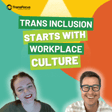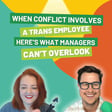
Staying the Course: Allyship, Burnout & Trans Rights
There are days when it feels like the tide is turning backwards - when every step forward for gender diversity is met with a wall of resistance, and showing up starts to feel just a bit too much.
This week, we’re talking about allyship burnout. The slow, quiet kind of exhaustion that creeps in when you care deeply but feel like nothing is shifting. We share the gentle practices that help us stay in it, the moments we’ve struggled, what brought us back, and the small ways we keep tending to this work, even when it feels heavy.
If you’ve been wondering how to keep going in the face of backlash and fatigue… you’re not alone. We're in this together!
We want your feedback! Got some ideas about how we can improve the podcast?! We’ve made a short, painless survey to find out what you think, what you want more of... and what topics you'd love to hear us cover next. Let us know your thoughts here
___________
Want to get in touch? Contact us at podcast@transfocus.ca
Join us on social media: LinkedIn | Instagram | TikTok | Threads | Facebook



















